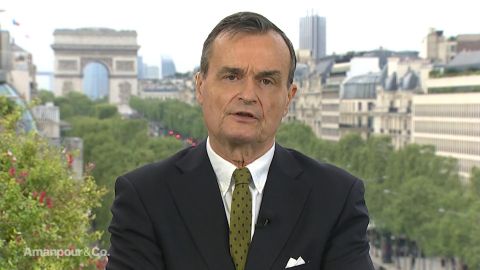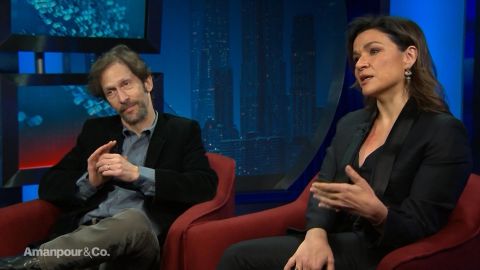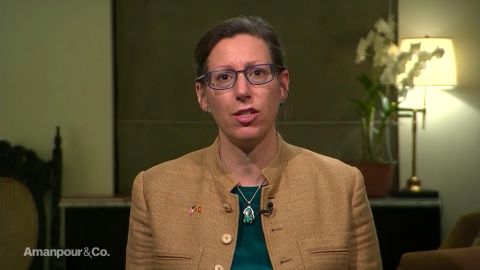Read Transcript EXPAND
CHRISTIANE AMANPOUR: Now, we’re going all the way back to 400 BC, the ancient Greek philosopher Socrates changed the way we look at the world forever, making us question what is right and wrong, what’s good and bad. The key existential questions that we still wrestle with, of course, today. Now, his infamous trial for being a disruptor within Greek society is onstage at The Public Theater in New York in collaboration with the Onassis Foundation. It’s written by actor, director and playwright Tim Blake Nelson, who you may remember from the Coen brothers film “O Brother, Where Art Thou?” Above all, Socrates is about democracy, and what we take for granted in an open and free society. Our Hari Sreenivasan sits down with Tim Blake Nelson and with Afroditi Panagiotakou of the Onassis Foundation.
HARI SREENIVASAN: Afroditi Panagiotakou, Tim Blake Nelson, thank you both for joining us. I want to start with a clip from Socrates.
(BEGIN VIDEO CLIP)
MICHAEL STUHLBARG, ACTOR, “SOCRATES”: The worthwhile person must consider only this, do I act rightly or wrongly? Am I a good man or bad? And were you to say to me right now, “Socrates, we will let you go free but you must stop philosophizing or face death.” I would answer that I will not stop but will keep pursuing, questioning everyone I meet saying, “You, Athenian, why do you seek wealth and power and every comfort but refuse to ask what your life and the world around you might actually mean?” What is true and what is not true in this blessed life? By doing so means to you that I corrupt our youth or I’m an atheist or worship the wrong gods, so be it. As long as I live freely, I shall do just as I have done no matter the mendacious accusations accusations you affix to it.
(END VIDEO CLIP)
SREENIVASAN: Tim Blake Nelson, what is Socrates doing right there?
TIM BLAKE NELSON, WRITER, “SOCRATES”: He’s representing himself at his own trial before 501 diecasts who are deciding whether he’s guilty as charged by the archon for having corrupted the youth of Athens for having practiced atheism, and for having worshiped unsanctioned gods. And he’s finished describing what it is, in terms of his own perception, that he has done in Athens in terms of wandering the city, questioning anyone he meets and how that has been misconstrued and contorted into these charges that will mean life or death for him.
SREENIVASAN: So here he is facing a life or death situation and talking to the people that could decide to kill him and that’s his attitude. That’s his tone.
NELSON: As I imagine it, yes, from what I’ve read. It certainly his tone in the play that wrote and this production, but I will say it’s very heavily researched.
SREENIVASAN: This is not a play that you wrote, in reaction to our reality today.
NELSON: Correct.
SREENIVASAN: When did you start working on it?
NELSON: Well, I really wanted to write this play 30 years ago when I was in drama school and I was very captivated by Socrates as not only a historical figure, but as a character. And then also between the — I was also captivated by the tension that exists between the historical figure of Socrates and then the Socrates and Plato, and they’re very different people and I tried to write the play then, and I just didn’t have the cleverness to try and take it on.
And it took really three decades of helping others to tell stories and sometimes telling my own, and also living in a democracy or I’d rather call what we live in here in America, a public. And also being a parent and a husband to restore the hubris that I had when I was in my 20s that maybe I could try and tell this story again.
And so it was in the summer of 2015 that I started writing this, but I don’t know, I guess like anyone who tries to create stuff and I think that there are no exceptions to this. Anybody who tries to create has to have their antenna in the air, and maybe I was picking up some stuff, just like any creative person does. And suddenly a lot of what I was writing about started to happen around me in the present reality of the United States and I just kept writing.
SREENIVASAN: Afroditi, this is part of a three-week festival called Democracy Is Coming. It’s a collaboration between the Onassis Foundation and The Public Theater. You’ve had several different themes to your festivals over the years, why democracy now?
AFRODITI PANAGIOTAKOU, DIRECTOR OF CULTURE, ONASSIS FOUNDATION: Well, even when it comes to the rest of the themes of our festivals democracy was always there. For us at the Onassis Foundation it’s health, education and culture when it comes to our pillars. But all of these three pillars are just vehicles in order to talk about the major issues like social justice and democracy and human rights. So in that sense, we try to be characters of the citizens of Athens or of the world, the same way that Socrates did in a way. So we want to pose the questions, and we want to bring people together and we try to collaborate with people who actually share the same adjectives that we do. So these adjectives or nouns or words are definitely words like democracy and, of course, democracy is always coming. It never arrived.
SREENIVASAN: Greece is the place that helped create this idea. Does Greece have it?
PANAGIOTAKOU: Yes, it does. First of all, if you are in a country where you can actually say that this is not democracy, that means there is. And there are other countries where they call themselves democracy, but do not go on Google. And if you say something against the president, you go to prison. So I guess that it’s good when a foundation like the Onassis foundation. And I need to stress here that yes, it is called a foundation but we’re never sponsors.
So, we are producers of content and we act as a platform for artists and thinkers and scientists. And we provide this content to as many people as possible. I think it’s important that we raise this kind of questions because the problem is actually when we sleep, and we take everything for granted.
SREENIVASAN: What’s the role of the arts in creating that public conversation about ideas like democracy?
PANAGIOTAKOU: Culture is not just the arts and arts is only part of culture. So I would say that the arts, yes, can do something. They can change your mind if they actually are a part of life, of culture, of general education, of the society itself. So I think that our job when it comes to the Onassis Foundation, again, is actually to be disruptors. Otherwise, we will think that everything is OK.
Everything is safe and in Greece, in particular, in Europe, but always, and forever and everywhere in the world certainties just die at some point and I think that this is what has happened in the U.S. This is what has happened in Europe. This is what Greece went through lately. So I think that through the arts, you can talk about the permanent possibility of the loss of certainties.
SREENIVASAN: What are the death of certainty do to Greece in the recent past?
PANAGIOTAKOU: Well, we realized that things like a job cannot be taken for granted. The fact that your pension cannot be taken for granted. The fact that you’re a public servant doesn’t mean anything. The fact that you lived in your country until the age of 40 doesn’t mean that you will be living in your country when you’re 45.
Did that make us wiser? Wisdom doesn’t last. But I think it really, really changed us. You need a tragedy, unfortunately, to understand life. And when it comes to ancient Greek tragedy, let’s just bear in mind that the protagonist, whether that is Antigone or whoever that is because we’re going to see Antigone as part of the festival, are never the solution to the problem. They are the problem. The problematic figures in any ancient Greek tragedy are the heroes, which is something completely different from Hollywood movies. So in order to be a hero, in order to be a protagonist, in a Greek tragedy, you have to cause problems, and you have to be full of trouble which is much closer to life.
SREENIVASAN: Yes, there’s one more clip I want to show. This is kind of encapsulating some of the wisdom that Socrates says that he has.
(BEGIN VIDEO CLIP)
STUHLBARG: What doesn’t he understand?
TEAGLE F. BOUGERE, ACTOR, “SOCRATES”: I know what you think he doesn’t understand that only by seeing this through will your life have meaning. You’re 70, but Athens feared you enough to condemn you, already proves your life has meaning.
STUHLBARG: One thing I’ve learned in 70 years is that man is well suited for tyranny, but especially when that tyranny is disguised as democracy.
BOUGERE: Meaning?
STUHLBARG: This is no longer about me.
BOUGERE:I thought you weren’t political.
STUHLBARG: Of course, I’m political.
(END VIDEO CLIP)
SREENIVASAN: What are you trying to say about democracy then versus now?
NELSON: With the line about disguising tyranny is democracy, I think that’s happening all over the world. And there’s another moment in the play where he says, “Anybody can use the word democracy and if, of course, there’s democracy in the title of the country of North Korea.
It’s a misused, misapplied word. I think that ancient Greece was far more of a democracy than what the United States of America is and we are now considered or we consider ourselves the great democracy of the world. But we’re really more of a republic, something of an oligarchy because you have to have a lot of money, and you have to be connected to a lot of money and you have to have a certain level of education.
That’s very expensive, for the most part, to get elected to high office. And so they’re just institutionally preventative measures that the government takes in being very selective about who ends up getting promoted to rule. And that wasn’t the case in Athens, where they drew names from urns, people were put into office through a lottery system. There were plebiscites pretty much on every major issue faced by the city state. And we don’t do that, we have experts whom we vote. There are almost platonic experts who’ve come up and they’ve been educated either as a — sometimes as autodidacts but usually through law school or very fancy educations in other topics. But they’ve been trained and schooled to lead in much more of a platonic sense. And we give them our vote. We don’t use plebiscites.
So in a sense, we’re less democratic than Athens was. One of the questions the play asks is, “Is that necessary a bad thing?” Why do we choose our leaders? How do we choose the best possible leaders? Why have we ended up with the leaders we do have right now? And these were questions being asked, in particular by Plato, back in the 4th century.
SREENIVASAN: Afroditi, one of the things that he points out is that democracy seems to be backsliding in several parts of the world. How do you see it evolving across Europe, for example?
PANAGIOTAKOU: Well, I would say that things are quite different in Europe but very scary. I think that we would never think that fascism would be that strong again. And I’m going back to this idea regarding that we shouldn’t be taken for granted things.
We thought that after two wars, two World Wars fascism wouldn’t be there as a term in our everyday discussions and now it is. So I would say that I’m very worried, I’m glad that is not just me, obviously. I’m glad that people are starting getting worried, whether we have like opportunities or non-opportunities like Brexit or Brexit in order to talk about it.
And people also understand that voting is not enough if you want to fight for democracy, if you want to fight for human rights. I can see that there’s a new form of activism all around Europe, so it’s no longer some eccentric hippies that are demonstrating in the streets. And I just go back to the ancient times not because of my fetishes or any of that. And in Greece we’re actually fighting not to be referring to our cultural heritage all of the time in order to prove that there’s something really interesting happening in our country.
So contemporary culture is something that we really care about, but the person who only cares about what was going on in his own private space back in ancient Greece was called idiotes from which the word idiot comes from. So the idiots according to ancient Greek is the person who only cares about his own private space.
So I think that is a matter of responsibility and not just some kind of, “We have the right to vote.” No, it’s our responsibility to vote. It’s our responsibility to be politically aware. Otherwise, I’m just a being but not a human being, so I think that since we were given this catastrophic intellect, well, we have to do something with it, so let’s not go after the dream of happiness. I think that we should go after the responsibility of awareness and then we will appreciate happiness in a different way anyway.
SREENIVASAN: You’ve been an actor, a director, screenwriter, how does this stack up? How hard was this?
NELSON: It’s taken a long time to get to the point where I could write this. But it wasn’t hard to write although it was thousands and thousands of pages of research, and then delving in almost forensically into Plato’s dialogues to try to find the real Socrates in there. Because, of course, most of what Socrates says in Plato, Socrates never said. It’s Plato putting his own ideas into the mouth of this figure whom he so admired for the approach he had to thinking. It was a lot of time, but it was quite joyous. I mean, I really get excited about this stuff and excited about the ideas. When Socrates and the pre-Socratic thinkers and also Plato and to a degree, Aristotle, were writing, the philosophers were really interested in the basics stuff: who are we, why do we do what we do, what’s good, what’s evil, what’s true, what’s false, how do you live — what’s called — a eudaemon life.
And that stuff really turns me on and so I have a religious fervor about the ancient thinkers. And so the more I can read of them and about them, the happier I am, so it was a great process.
SREENIVASAN: Tim Blake Nelson, Afroditi Panagiotakou, thank you both.
PANAGIOTAKOU: Thank you so much for having us.
About This Episode EXPAND
Christiane Amanpour speaks with Alaina Teplitz, the U.S. Ambassador to Sri Lanka and Gérard Araud, the former French Ambassador to the U.S. Hari Sreenivasan speaks with Tim Blake Nelson and Afroditi Panagiotakou about adapting the infamous trials of Socrates for the stage.
LEARN MORE


